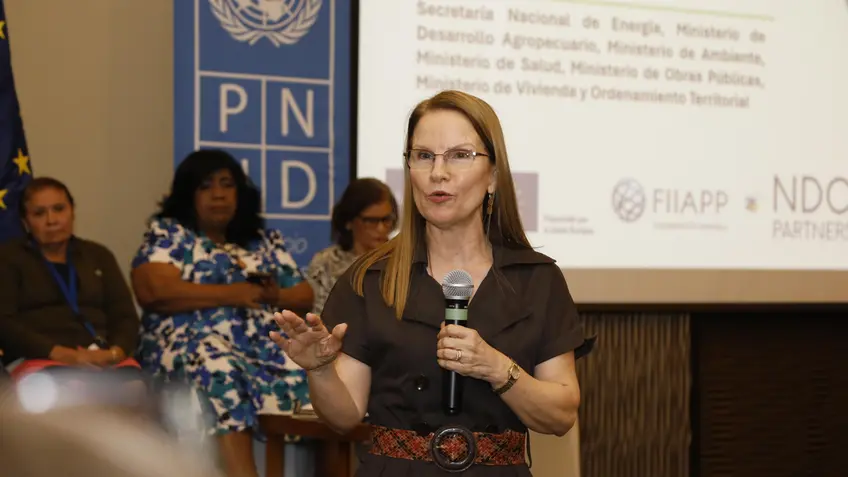Panama Launches New NDC 3.0, Raising National Climate Ambition
Ligia Castro de Doens, Director of Climate Change at the Ministry of Environment, presents Panama’s National Determined Contribution 3.0 at the national launch.
Panama City, Panama, 31 May 2024 - The Government of Panama launched its new Nationally Determined Contribution (NDC), “Segunda Contribución Determinada a Nivel Nacional (CDN2),” reaffirming its commitment to climate action under the Paris Agreement. It is the first country to present its NDC 3.0, the third generation of NDCs due in 2025 under the Paris Agreement’s current ambition cycle. This national launch precedes their official submission to the United Nations Framework Convention on Climate Change (UNFCCC).
"Our increased ambition for the NDC 3.0 demonstrates our commitment to sustainability and competitiveness. This is not just a reflection of our capabilities but also of our aspiration to remain carbon negative," said Diana Laguna, Vice Minister of Environment.
"The NDC 3.0 process has provided us the opportunity to reflect greater climate ambition based on an integrated approach to adaptation and mitigation under the principles of climate justice, equity and common but differentiated responsibilities," said Ligia Castro de Doens, Climate Change Director.
Building on the 2020 NDC update, Panama’s NDC 3.0 significantly raises the country’s climate ambition. It includes 54 new and 9 revised commitments, expanding its focus on strategic sectors, including energy, forestry and marine and coastal environments, along with cross-sectoral initiatives. These commitments aim to enhance overall greenhouse gas mitigation and adaptation efforts, with a focus on achieving net-negative emissions by 2050.
Recognizing the country’s vulnerability to climate change, Panama’s NDC 3.0 prioritizes sectors that are most at risk, offering a roadmap for economic diversification and resilience building that aligns with the National Climate Change Policy (2050), the Long-Term Low Emission and Climate Resilient Development Strategy (2050 LTS) and the National Action Plan for Climate Empowerment (ENACE).
The process was driven by a whole-of-government planning approach and whole-of-society participation, dialogue and consensus within a framework of human rights and gender equality.
One of the first countries to join the NDC Partnership in 2016, Panama has demonstrated climate leadership by aligning climate and development agendas and promoting gender equity. Its progress has been supported by a number of key organizations, including the United Nations Development Programme (UNDP), the Food and Agriculture Organization of the United Nations (FAO) and the European Union's EUROCLIMA Programme.
“We extend our congratulations to the Government of Panama for being the first country globally to present a new climate commitment in this new ambition cycle,” said Pablo Vieira, Global Director of the NDC Partnership Support Unit. “This achievement reflects Panama's ongoing dedication to the international climate agenda, showing leadership in addressing one of the most critical challenges of our time.”
Panama received support in developing its NDC 3.0 through the NDC Partnership’s Global Call for NDCs 3.0 & LT-LEDS, formerly known as the Thematic Call on LT-LEDS and NDC Alignment, Update and Enhancement. Building on support from the NDC Partnership’s Climate Action Enhancement Package (CAEP) and the Partnership Action Fund (PAF), this work focused on identifying priority sectors and developing an Enhanced Transparency Framework for concrete goalsetting.
For media inquiries: Caity Pinkard, Communications Manager, Outreach & Governance, NDC Partnership Support Unit: caitlin.pinkard@ndcpartnership.org
About the NDC Partnership
The NDC Partnership is a global coalition, bringing together more than 200 members, including more than 120 countries, developed and developing, and nearly 100 institutions to deliver on ambitious climate action that helps achieve the Paris Agreement and drive sustainable development. Governments identify their NDC implementation priorities and the type of support that is needed to translate them into actionable policies and programs. Based on these requests, the membership offers a tailored package of expertise, technical assistance and funding. This collaborative response provides developing countries with efficient access to a wide range of resources to adapt to and mitigate climate change and foster more equitable and sustainable development.
